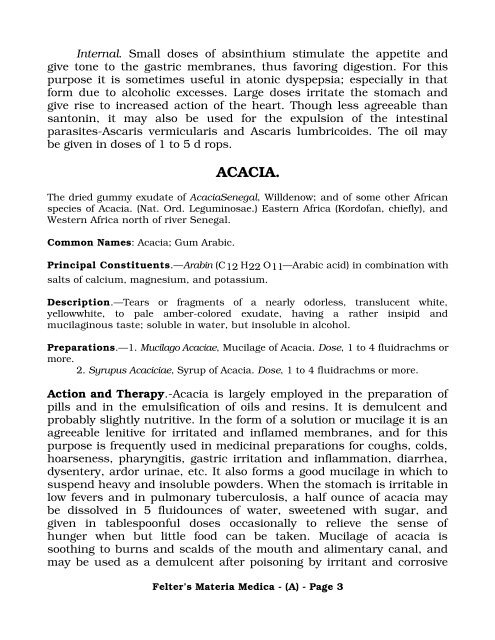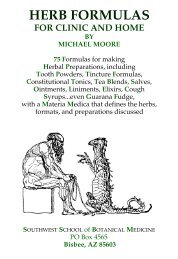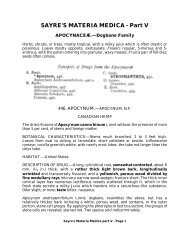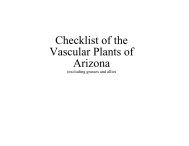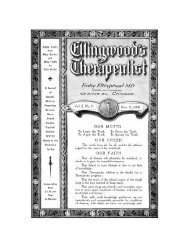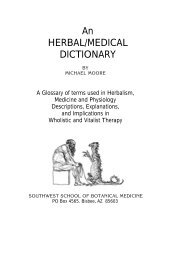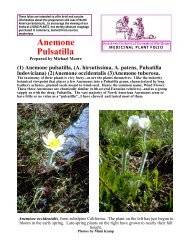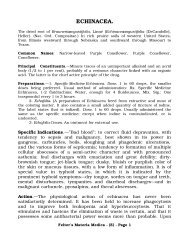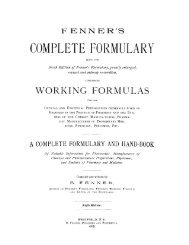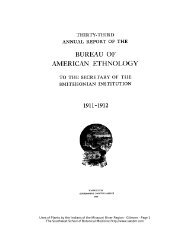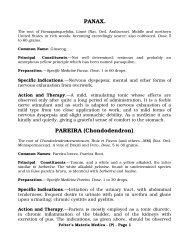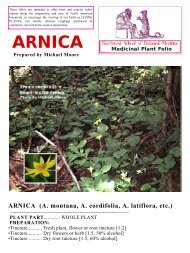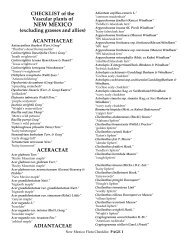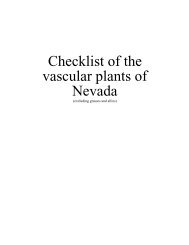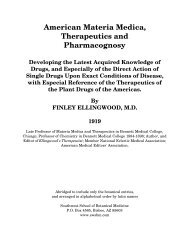Individual Drugs. ABIES (Tsuga canadensis). - Southwest School of ...
Individual Drugs. ABIES (Tsuga canadensis). - Southwest School of ...
Individual Drugs. ABIES (Tsuga canadensis). - Southwest School of ...
Create successful ePaper yourself
Turn your PDF publications into a flip-book with our unique Google optimized e-Paper software.
Internal. Small doses <strong>of</strong> absinthium stimulate the appetite and<br />
give tone to the gastric membranes, thus favoring digestion. For this<br />
purpose it is sometimes useful in atonic dyspepsia; especially in that<br />
form due to alcoholic excesses. Large doses irritate the stomach and<br />
give rise to increased action <strong>of</strong> the heart. Though less agreeable than<br />
santonin, it may also be used for the expulsion <strong>of</strong> the intestinal<br />
parasites-Ascaris vermicularis and Ascaris lumbricoides. The oil may<br />
be given in doses <strong>of</strong> 1 to 5 d rops.<br />
ACACIA.<br />
The dried gummy exudate <strong>of</strong> Acacia Senegal, Willdenow; and <strong>of</strong> some other African<br />
species <strong>of</strong> Acacia. (Nat. Ord. Leguminosae.) Eastern Africa (Kord<strong>of</strong>an, chiefly), and<br />
Western Africa north <strong>of</strong> river Senegal.<br />
Common Names: Acacia; Gum Arabic.<br />
Principal Constituents.—Arabin (C12 H22 O11—Arabic acid) in combination with<br />
salts <strong>of</strong> calcium, magnesium, and potassium.<br />
Description.—Tears or fragments <strong>of</strong> a nearly odorless, translucent white,<br />
yellowwhite, to pale amber-colored exudate, having a rather insipid and<br />
mucilaginous taste; soluble in water, but insoluble in alcohol.<br />
Preparations.—1. Mucilago Acaciae, Mucilage <strong>of</strong> Acacia. Dose, 1 to 4 fluidrachms or<br />
more.<br />
2. Syrupus Acaciciae, Syrup <strong>of</strong> Acacia. Dose, 1 to 4 fluidrachms or more.<br />
Action and Therapy.-Acacia is largely employed in the preparation <strong>of</strong><br />
pills and in the emulsification <strong>of</strong> oils and resins. It is demulcent and<br />
probably slightly nutritive. In the form <strong>of</strong> a solution or mucilage it is an<br />
agreeable lenitive for irritated and inflamed membranes, and for this<br />
purpose is frequently used in medicinal preparations for coughs, colds,<br />
hoarseness, pharyngitis, gastric irritation and inflammation, diarrhea,<br />
dysentery, ardor urinae, etc. It also forms a good mucilage in which to<br />
suspend heavy and insoluble powders. When the stomach is irritable in<br />
low fevers and in pulmonary tuberculosis, a half ounce <strong>of</strong> acacia may<br />
be dissolved in 5 fluidounces <strong>of</strong> water, sweetened with sugar, and<br />
given in tablespoonful doses occasionally to relieve the sense <strong>of</strong><br />
hunger when but little food can be taken. Mucilage <strong>of</strong> acacia is<br />
soothing to burns and scalds <strong>of</strong> the mouth and alimentary canal, and<br />
may be used as a demulcent after poisoning by irritant and corrosive<br />
Felter’s Materia Medica - (A) - Page 3


